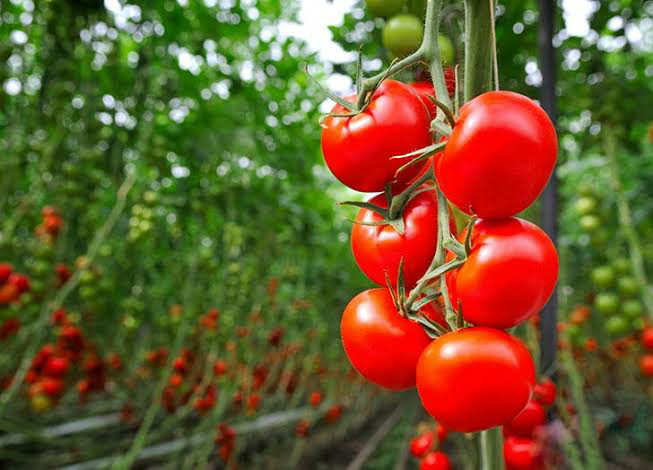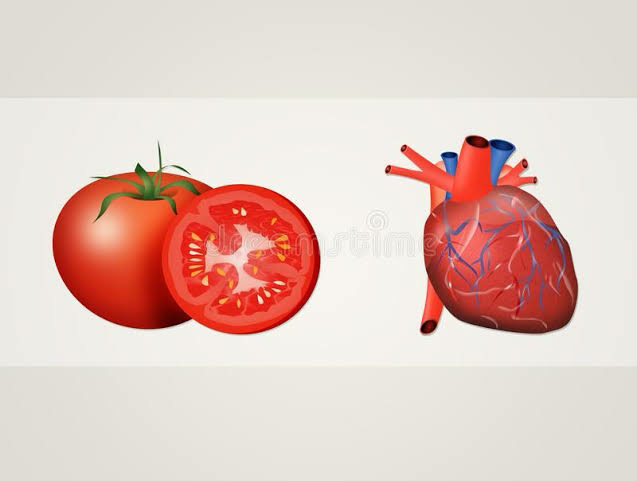Want to increase Memory ? Try these few tricks!
Eating Habits: That People Still Think Are Healthy
Hello readers!
Few facts that we will discuss in this article are most common mistakes that people make while eating or drinking healthy diets.
Let's discuss few of them here,
1. CARROT
2.Water
Drinking lots of water is good. But too much water can create electrolyte imbalances, due to free sodium and potassium ions being lost by sweating and defecating. Another more extreme consequence is an accumulation of water in the brain that causes it to swell and increase pressure on the skull. Although rare, both cases have been seen in athletes who often feel they need rehydration after a long workout or in people with kidney problems.
3. AVOCADO
Avocados contain fiber and lots of vitamins. It can also help you lower bad cholesterol (LDL) and maintain your body's cells due to its high content of monounsaturated fat. But. fat is still fat. An avocado contains 240 calories, accounting for about 10% to 20% of the ideal calories of a normal person. Eating too many calories can lead to artery blockage problems. Avocados are also a high FODMAP food, meaning they contain carbohydrates that may not be digested or absorbed well. A person should eat about half or at most 1 avocado per day.
4.BEETROOT
Beets are an excellent source of vitamins and minerals. It also contains lots of nitric oxide which your body will convert into nitrate to help lower blood pressure. But this substance can then be converted into nitrosamine also found in meat, meaning it may increase the risk of causing esophageal or stomach cancer. Because of this, it's best to avoid incorporating large amounts of beets and red meat when cooking.
5. SEAWEED
Seaweed is a rare example of a non-animal product but rich in vitamin B12, making it a great alternative to meat in a vegetarian diet. It has also been promoted as a superfood that can help you lose weight thanks to its high iodine and fiber content. But high amounts of iodine can lead to thyroid problems and even . weight gain. Seaweed may also contain large amounts of heavy metal depending on where it is grown.
6.SOYA and Its Derivatives
Soy foods are rich in nutrients including high quality B vitamins, fiber, potassium, magnesium and protein. It is considered a complete protein because it contains all nine essential amino acids that the body cannot make. But if you are having a recent diet change due to thyroid problems, be careful. Soy may interfere with the hormone drugs used to treat hypothyroidism in female patients. Although studies do not yield conclusive conclusions, it is worth observing carefully.
7.CHIA Seeds
Chia seeds have been sold as a superfood because of their high omega-3 content, so far there is no evidence to suggest their health benefits, especially related to heart disease. circuit. Omega 3s contained in chia seeds are harder to absorb than those offered by salmon, by weight. And most notably, 100 grams of chia seeds contain about 500 calories, the equivalent of a hamburger in a fast food restaurant.
References :- Google Search , Wikipedia, Scienceinfo,
Thank you for your Valuable time .
Stay Healthy and Stay Blessed.
Health benefits of tomatoes 🍅
LOWER CHOLESTROL IN 2-3 DAYS BY HOME REMEDY
Now a days the life style is changing and human is moving from its natural life to an artificial lifestyle. The advancement of digitalization and the methods of producing and processing of food is making detrimental effects on the human body.
They were the ancestors who managed their life with the boon of nature and surviving themselves within the womb of mother nature. Mother nature has provided us with the immense and vast herbs on this planet and if a man swim along with it than he may not suffer from any kind of discomfort in it's life. History has shown many evidences and consequences in the past about the depart of man from the rules of nature.
But still mother nature always loved its species dwelling upon it and always took care of them. Still due to the changing habits of mankind and eating behavior of them is creating many or most diseases and discomfort in the body.
One such phenomenon is Blood pressure , a phenomenon which can be described as pressure exerted by the heart on the walls of arteries, even though we know that a normal blood pressure in human body is 120/80 and some variations can be accepted depending upon many factors such as age, job schedule, lifestyle, stress level and exercise. But in certain cases, even when we go with safer side of health, somehow certain circumstances abruptly imbalance the human vitals and one such human vital is above mentioned.
When the walls of the arteries get thick in width due to excess oily meal and continuously taking stress because stress plays a vital role in increasing the BP and cholesterol level in our body. So here BP and cholesterol are co-related with each other because higher cholesterol will not let your blood pass through the arteries and this can create a fatal condition in human even heart attack or death also.
Here I will share a simple home remedy to reduce the condition of high Cholesterol and BP in few days only. It is a simple method and can be easily done at home.
Following ingredients will be needed to prepare it:-
1) 36 cloves of garlic
2) 4 lemon
3) water
That's all we require to get this incredibly healthy thing
Method :-
. Cut these 36 cloves into pieces
. Cut lemon in three-four pieces
. Take 1 liter of water and start boiling it .
. Put all the ingredients in it and let the water boil.
. Now boil the water until it become half liter from one liter.
. Now take that water in another vessel and throw the residual.
Your recipe is ready to drink.
Dosage :-
.One fourth of glass in morning and evening empty stomach .
. Do it for three to four days and prepare this daily daily in the morning as per requirement.
Stay healthy and stay blessed...
Here I will discuss only one particular home remedy which
PROTEIN IMPORTANCE IN BODY
Now a days the trend is going on that people are using protein powders to build their body or to increase their stamina but few people are aware about the disadvantages of its over dose.
In this article we will first discuss about the function and advantages of protein in body and later the disadvantages of its over dose.
IMPORTANCE OF PROTEIN IN HUMAN BODY :-
Excluding water and fat, the entirely human body is made up of protein. Protein is the main component of muscle, bone, organ, skin and nails. Excluding water the muscles are made up of 80% of protein, making this nutrient very important for the human body.
HOW IS PROTEIN USED IN HUMAN BODY:-
The body break down the protein into amino acid and absorbs it. It is used to build muscles and organs and to make hormones and antibodies.
HOW MUCH PROTEIN DOES THE BODY NEED:
The daily maximum amount of protein a body should get is 2gms/kg of body weight.Consuming more will not increase synthesis but increase the amount consumed as energy and lead to an increase in body fat. Too much of protein can also burden lever and kidney.
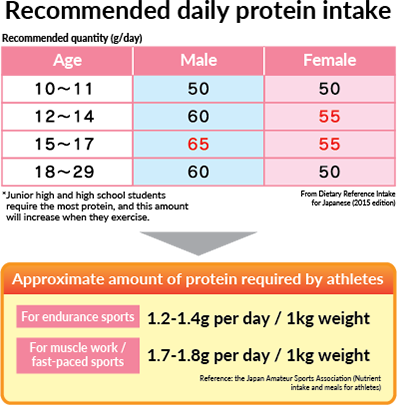
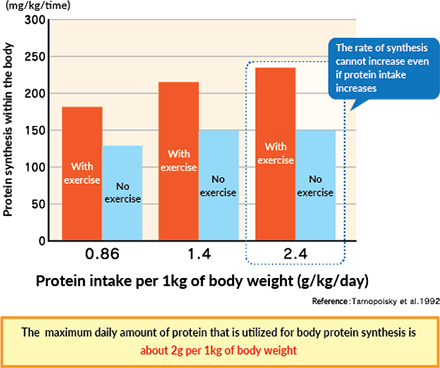
* It is important to adjust the amount of protein you consume everyday.
*If you eat three well balanced meals a day, you should easily be able to acquire the amount of protein your body needs. The important thing is not only how much you eat, but also what you eat and when you eat it.
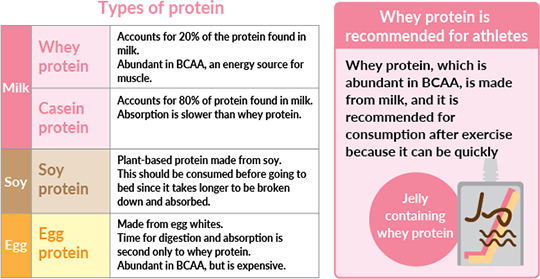
CONSUMING PROTEIN AND CARBOHYDRATE TOGETHER:-
When protein is consumed along with carbohydrates (sugar or glucose), blood sugar rises and insulin is produced, promoting amino acid synthesis.
Carbohydrates are also used as the first energy source, preventing the use of amino acids. After exercise, it is a good idea to have something like a jelly drink that allows you to consume both carbohydrates and protein at the same time.
WHEN TO CONSUME PROTEIN:-
It is important to consume protein at the right time. The ideal time to consume it is immediately after exercise.
The body breaks down protein faster immediately following exercise, and also synthesizes it more actively, leading to more amino acids being absorbed into the muscles.
LEMON WATER :- HEALTH BENEFITS.
LEMON WATER
With the changing world the diet issues of people are also changing, now a days people are using many methods to maintain their fitness level and they are moving towards the ancient methods which were used by our ancestors.
And since the ancient times Lemon water played a very important role to improve health problems, few are listed below :-
1. It promotes hydration
According to the Food and nutrition board, general guidelines say that women should get at least 91 ounces per day and men should get at least 125 ounces. This includes water from food and drinks.Water is the best beverage for hydration, but some people don’t like the taste of it on its own. Adding lemon enhances water’s flavor, which may help you drink more.
2. It’s a good source of vitamin C
Citrus fruits like lemons are high in vitamin C, a primary antioxidant that helps protect cells from damaging free radicals. You’ve probably heard that vitamin C may help prevent or limit the duration of the common cold in some people, but studies are conflicting.
Vitamin C may reduce your risk of cardiovascular disease and stroke, and lower blood pressure.
While lemons don’t top the list of citrus fruits high in vitamin C, they’re still a good source. According to the United States Department of Agriculture Trusted Source, the juice of one lemon provides about 18.6 milligrams of vitamin C. The recommended daily amount for adults is 65 to 90 milligrams.
3. It supports weight loss
Research has shown that antioxidants found in lemons significantly reduces weight gain in mice that are overfed in order to induce obesity.
In these mice studies, the antioxidant compounds also offset the negative effects on blood glucose levels and improved insulin resistance, the two main factors in the development of type 2 diabetes.
While the same results need to be proven in humans, anecdotal evidence is strong that lemon water supports weight loss. Whether this is due to people simply drinking more water and feeling full or the lemon juice itself is unclear.
4. It improves your skin quality
Vitamin C found in lemons may help reduce skin wrinkling, dry skin from aging, and damage from the sun. How water improves skin is controversial, but one thing is certain. If your skin loses moisture, it becomes dry and prone to wrinkles. A 2016 laboratory study showed that a citrus-based drink helped prevent the development of wrinkles in hairless mice.
5. It aids digestion
Some people drink lemon water as a daily morning laxative to help prevent costipation. Drinking warm or hot lemon water when you wake up may help get your digestive syst moving.
Ayurvedic medicine says the sour lemon taste helps stimulate your “agni.” In ayurvedic medicine, a strong agni jump-starts the digestive system, allowing you to digest food more easily and helping to prevent the buildup of toxins.
6. It freshens breath
Have you ever rubbed a lemon on your hands to get rid of the smell of garlic or some other strong odor? The same folk remedy may apply to bad breath caused by eating foods with strong smells such as garlic, onions, or fish.
You might avoid bad breath by drinking a glass of lemon water after meals and first thing in the morning. Lemon is thought to stimulate saliva and water also helps prevent a dry mouth, which can lead to bad breathe caused by bacteria.
7. It helps prevent kidney stones
The citric acid in lemons may help prevent kidney stones. Citrate, a component of citric acid, paradoxically makes urine less acidic and may even break up small stones. Drinking lemon water not only gets you citrate, but also the water you need to help prevent or flush out stones.
These were the few major uses of lemon water we have seen, now lets see a method to prepare lemon water:-
How to make lemon water
In order to reap any health benefits of lemon water, you need drink it consistently, and you need more than just a single wedge of lemon in your mug.
When making lemon water, always use fresh lemons rather than artificial lemon from a bottle.
To make lemon water, squeeze half a lemon into 8 ounces of warm or cold water. To make the drink as healthy as possible, use filtered water and organic lemons.
Infuse more flavor or add a health boost to lemon water by adding:
- a few springs of mint
- a teaspoon raw honey
- a slice of fresh ginger
- a dash of cinnamon
- a sprinkle of turmeric
You can also add slices of other fresh citrus fruits such as limes and oranges, or cucumber slices. Always wash the produce well before slicing and using.
Having lemon ice cubes on hand is a great way to add lemon to your water fast. Simply squeeze fresh lemon juice into ice cube trays and freeze. Drop a few cubes into a glass of cold or hot water as needed.
You can start your morning with a mug of warm lemon water, and keep a pitcher of water infused with a few sliced lemons in your refrigerator to drink throughout the day.
so its a request to you all that start this method from today and you will see the result within 21 days but remember not to use too much lemon for daily use, keep it limited and stay healthy.
lemon water is a miracle and replace it with morning tea or any juice that you love to take.
stay healthy and stay blessed
GYM DIET :- WHAT TO EAT AND WHAT TO AVOID
Bodybuilding is centered around building your body’s muscles through weightlifting and nutrition.
Whether recreational or competitive, bodybuilding is often referred to as a lifestyle, as it involves both the time you spend in and outside the gym.
In order to maximize your results from the gym, you must focus on your diet, as eating the wrong foods can be detrimental to your bodybuilding goals.
This article explains what to eat and avoid on a bodybuilding diet and provides a one-week sample menu.
Bodybuilding Basics
Bodybuilding differs from powerlifting or Olympic lifting in that it’s judged on a competitor’s physical appearance rather than physical strength.
As such, bodybuilders aspire to develop and maintain a well-balanced, lean and muscular physique.
To do this, many bodybuilders start with an off-season followed by an in-season way of eating — referred to as a bulking and cutting phase, respectively.
During the bulking phase, which can last months to years, bodybuilders eat a high-calorie, protein-rich diet and lift weights intensely with the goal of building as much muscle as possible.
The following cutting phase focuses on losing as much fat as possible while maintaining muscle mass developed during the bulking phase. This is achieved through specific changes in diet and exercise over a period of 12–26 weeks.
Bodybuilding training and dieting is typically divided into two phases: bulking and cutting. The goal of the bulking phase is to build muscle, whereas the cutting phase is dedicated to preserving muscle while losing body fat.
Benefits of Bodybuilding
There are several health benefits associated with bodybuilding.
In order to maintain and build muscles, bodybuilders exercise frequently, performing both resistance and aerobic training.
Resistance training increases muscle strength and size. Muscle strength is highly correlated with a lower risk of dying from cancer, heart and kidney disease, as well as several other critical illnesses.
Aerobic exercise, which bodybuilders regularly implement to reduce body fat, improves heart health and significantly lowers your risk of developing or dying from heart disease — the number one killer in America.
In addition to exercise, bodybuilders also focus on their nutrition.
With careful planning, bodybuilders can eat in a way that not only supports their efforts in the gym but keeps them healthy too.
Following a healthy eating pattern, including nutrient-dense foods from all food groups in appropriate amounts, can significantly lower your risk of chronic diseases.
Bodybuilders exercise regularly and may eat well-planned and nutrient-dense diets, both of which offer many health benefits.
Calorie Needs and Macronutrients
The goal for competitive bodybuilders is to increase muscle mass in the bulking phase and reduce body fat in the cutting phase. Hence, you consume more calories in the bulking phase than in the cutting phase.
How Many Calories Do You Need?
The easiest way to determine how many calories you need is to weigh yourself at least three times a week and record what you eat using a calorie tracking app.
If your weight stays the same, the daily number of calories you eat is your maintenance calories — in other words, you’re not losing or gaining weight, but maintaining it.
During your bulking phase, it’s recommended to increase your calorie intake by 15%. For example, if your maintenance calories are 3,000 per day, you should eat 3,450 calories per day (3,000 x 0.15 = 450) during your bulking phase.
When transitioning from a bulking to a cutting phase, you would instead decrease your maintenance calories by 15%, meaning you would eat 2,550 calories per day instead of 3,450.
As you gain weight in the bulking phase or lose weight in the cutting phase, you will need to adjust your calorie intake at least monthly to account for changes in your weight.
Increase your calories as you gain weight in the bulking phase and decrease your calories as you lose weight in the cutting phase for continued progression.
During either phase, it’s recommended not to lose or gain more than 0.5–1% of your body weight per week. This ensures that you don’t lose too much muscle during the cutting phase or gain too much body fat during the bulking phase.
Macronutrient Ratio
Once you establish the number of calories you need, you can determine your macronutrient ratio, which is the ratio between your protein, carbohydrate and fat intake.
Unlike the difference in your calorie needs between the bulking and cutting phase, your macronutrient ratio does not change.
Protein and carbs contain four calories per gram, and fat contains nine.
It’s recommended that you get:-
30–35% of your calories from protein
55–60% of your calories from carbs
15–20% of your calories from fat
Here’s an example of the ratio for both a bulking and cutting phase:
Bulking phase Cutting phase
Calories 3,450. 2,550
Protein (grams) 259–302. 191–223
Carbs (grams). 474–518. 351–383
Fat (grams) 58–77. 43–57
These are general guidelines, so its best to consult with a registered dietitian to determine your individual needs based on your goals to make sure your diet is nutritionally adequate.
Bodybuilding Nutrition: Foods to Eat and Avoid
Like training, diet is a vital part of bodybuilding.
Eating the right foods in the appropriate amounts provides your muscles with the nutrients they need to recover from workouts and grow bigger and stronger.
Conversely, consuming the wrong foods or not consuming enough of the right ones will leave you with subpar results.
Here are foods you should focus on and foods to limit or avoid:
Foods to Focus On
The foods you eat don’t need to differ between the bulking and cutting phase — usually, it’s the amounts that do.
Foods to eat include:-
Meats, poultry and fish: Sirloin steak, ground beef, pork tenderloin, venison, chicken breast, salmon, tilapia and cod.
Dairy: Yogurt, cottage cheese, low-fat milk and cheese.
Grains: Bread, cereal, crackers, oatmeal, quinoa, popcorn and rice.
Fruits: Oranges, apples, bananas, grapes, pears, peaches, watermelon and berries.
Starchy vegetables: Potatoes, corn, green peas, green lima beans and cassava.
Vegetables: Broccoli, spinach, leafy salad greens, tomatoes, green beans, cucumber, zucchini, asparagus, peppers and mushrooms.
Seeds and nuts: Almonds, walnuts, sunflower seeds, chia seeds and flax seeds.
Beans and legumes: Chickpeas, lentils, kidney beans, black beans and pinto beans.
Oils: Olive oil, flaxseed oil and avocado oil.
Foods to Limit
While you should include a variety of foods in your diet, there are some you should limit.
These include:
Alcohol: Alcohol can negatively affect your ability to build muscle and lose fat, especially if you consume it in excess.
Added sugars: These offer plenty of calories but few nutrients. Foods high in added sugars include candy, cookies, doughnuts, ice cream, cake and sugar-sweetened beverages, such as soda and sports drinks.
Deep-fried foods: These may promote inflammation and — when consumed in excess — disease. Examples include fried fish, french fries, onion rings, chicken strips and cheese curds.
In addition to limiting these, you may also want to avoid certain foods before going to the gym that can slow digestion and cause stomach upset during your workout.
These include:
High-fat foods: High-fat meats, buttery foods and heavy sauces or creams.
High-fiber foods: Beans and cruciferous vegetables like broccoli or cauliflower.
Carbonated beverages: Sparkling water or diet soda.
Bodybuilding Supplements
Many bodybuilders take dietary supplements, some of which are useful while others are not.
The best bodybuilding supplements include:
- Whey protein: Consuming whey protein powder is an easy and convenient way to increase your protein intake.
- Creatine: Creatine provides your muscles with the energy needed to perform an additional rep or two. While there are many brands of creatine, look for creatine monohydrate as it’s the most effective
Trusted So - Caffeine: Caffeine decreases fatigue and allows you to work harder. It’s found in pre-workout supplements, coffee or tea.
Source
A multi-vitamin and mineral supplement may be helpful if you’re limiting your calorie intake in an effort to reduce body fat during your cutting phase.
One-Week Sample Menu
Monday
Breakfast: Scrambled eggs with mushrooms and oatmeal.
Snack: Low-fat cottage cheese with blueberries.
Lunch: Venison burger, white rice and broccoli.
Snack: Protein shake and a banana.
Dinner: Salmon, quinoa and asparagus.
Tuesday
Breakfast: Protein pancakes with light-syrup, peanut butter and raspberries.
Snack: Hard-boiled eggs and an apple.
Lunch: Sirloin steak, sweet potato and spinach salad with vinaigrette.
Snack: Protein shake and walnuts.
Dinner: Ground turkey and marinara sauce over pasta.
Wednesday
Breakfast: Chicken sausage with egg and roasted potatoes.
Snack: Greek yogurt and almonds.
Lunch: Turkey breast, basmati rice and mushrooms.
Snack: Protein shake and grapes.
Dinner: Mackerel, brown rice and salad leaves with vinaigrette
Thursday
Breakfast: Ground turkey, egg, cheese and salsa in a whole-grain tortilla.
Snack: Yogurt with granola.
Lunch: Chicken breast, baked potato, sour cream and broccoli.
Snack: Protein shake and mixed berries.
Dinner: Stir-fry with chicken, egg, brown rice, broccoli, peas and carrots.
Friday
Breakfast: Blueberries, strawberries and vanilla Greek yogurt on overnight oats.
Snack: Jerky and mixed nuts.
Lunch: Tilapia fillets with lime juice, black and pinto beans and seasonal veggies.
Snack: Protein shake and watermelon.
Dinner: Ground beef with corn, brown rice, green peas and green beans.
Saturday
Breakfast: Ground turkey and egg with corn, bell peppers, cheese and salsa.
Snack: Can of tuna with crackers.
Lunch: Tilapia fillet, potato wedges and bell peppers.
Snack: Protein shake and pear.
Dinner: Diced beef with rice, black beans, bell peppers, cheese and pico de gallo.
Sunday
Breakfast: Eggs sunny-side up and avocado toast.
Snack: Protein balls and almond butter.
Lunch: Pork tenderloin slices with roasted garlic potatoes and green beans.
Snack: Protein shake and strawberries.
Dinner: Turkey meatballs, marinara sauce and parmesan cheese over pasta.
Thanks for reading .
Stay healthy and stay fit.
Damaged Liver ?????? ..Herb that can cure Liver-Blood- And Much More !
Picrorhiza kurroa (Kutki) Picror...

-
Bodybuilding is centered around building your body’s muscles through weightlifting and nutrition. Whether recreational or compet...
-
Toasting to the holidays? Some studies show that beer consumed in moderation may be beneficial to your health. Here...














